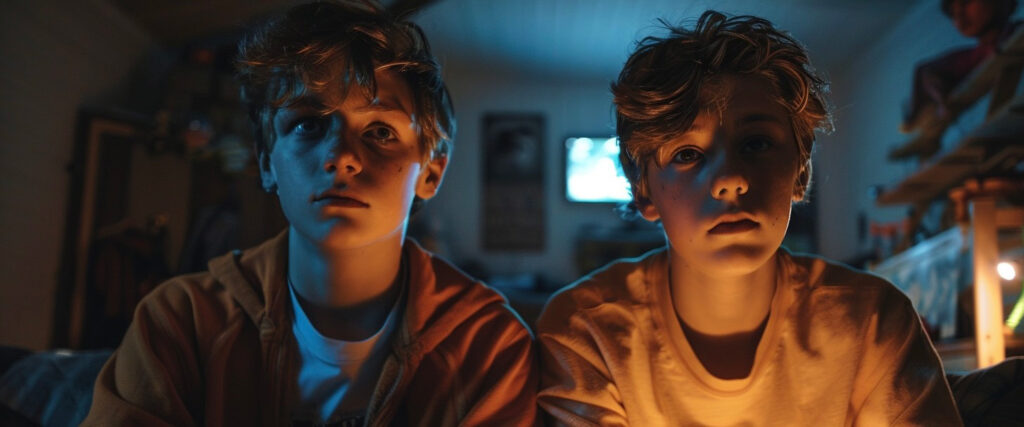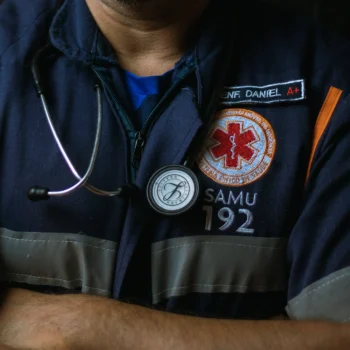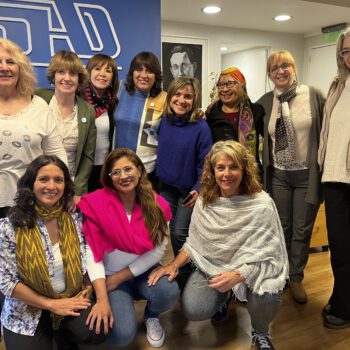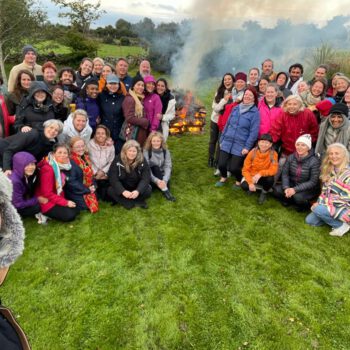A Compassionate Inquiry® Practitioner, Life Coach and Meditation Teacher, Nancy balances her practice with raising a family of three joyful neurodiverse sons, alongside her husband of 23 years. Through her deep personal healing of ADHD-related core wounds and addiction, with Compassionate Inquiry®, Nancy has become the mother to herself that she always needed in order to thrive.This post is a short edited excerpt of Nancy’s interview which explores her personal experiences living with her own and her children’s ADHD. Hear her full interview on The Gifts of Trauma Podcast.

ADHD is definitely not a deficit of attention. In my opinion it is all of the attention, all at the same time. Quite often, I’ll start doing one task then bounce around all of the other tasks in my mind. ADHD shows up differently for everybody, but always, a lot shows up at the same time. That’s the common denominator. ADHD also interlinks with anxiety, depression, dyslexia, OCD, ASD… So depending on the individual, it can vary widely.
I always knew my brain worked differently, so when my son chose to have an ADHD diagnosis at 14 and it came back positive, I thought, ‘right, that’s probably me as well.’ My husband laughs at me and my eldest son because we are so similar with things like forgetfulness and messiness. I believe my husband also has ADHD but he’s on the spectrum, so he’s really good with timing, plans, schedules, and control. Our family balances out.
Being in the company of people with ADHD can be dysregulating. ADHD clients who talk a lot, very quickly, can pull me out of my groundedness. So I regulate myself in client sessions, sometimes interrupting to ask them to slow down. In my day-to-day life, when I’m with others of a similar ilk, I can be very excitable. It can be fun, lively, bubbly and energetic… but I often come away feeling extremely depleted and need time alone to regulate myself again. If I’m in a group with loud, energetic people, I withdraw and hold back. Groups have always been difficult for me, a challenge I’ve largely overcome, but there’s still work to do, especially socially.
I was at a small garden party recently, sitting with two lovely ladies who were having a conversation. I was with them, but I wasn’t talking. I hadn’t realized I’d completely zoned out until one of them turned to me and said, “Oh, Nancy, I’d really love to know what you’re thinking.”
Theories about what causes ADHD range from nutritional toxicity to a desire for instant gratification, a loss of societal structure, a neurodevelopmental disorder, low levels of dopamine, the interaction of several genes, abnormalities related to frontal subcortical function, and memory consolidation. On the other hand, Gabor Maté’s description of the roots of ADHD in his book, Scattered Minds, rings true for me. Rather than seeing ADHD as a genetic or medical disorder, he suggests it’s a developmental issue influenced by adaptive responses to childhood stress and trauma. Gabor also says that while everyone with ADHD has the genes for sensitivity, not everybody who is highly sensitive will have ADHD.
As a highly sensitive child, I remember feeling shame when I was so often told, “Don’t be so ridiculous, stop making a fuss.” I pushed the shame down and kept it inside, while on the outside I learned to smile, look calm, relaxed and happy. My dad was a ‘mostly absent,’ highly sensitive musician who never openly expressed emotion, but I could sense it in him when he was making music. As a young child in World War 2, he was evacuated away from his family and grew up in poverty. So there was trauma there. My mum possibly had ADHD. She was anxious, depressed, dysregulated and self medicated for some of my childhood. She was also erratic with her emotional availability, and my own emotions were not well tolerated unless I was happy and smiling. So while my mum did her absolute best, the early attunement I needed wasn’t there. I know how much she loved me and how hard she worked. I also know how much she tried to meet my needs, but she just wasn’t able to.
Now I can see how my early childhood experiences made me unavailable for my two eldest sons. I was stressed, dysregulated, lacking community and family support. My sister was busy with her family. I had a bit of help from my mum, but that was a struggle because she parented in the old fashioned way. She’d want to put my son in the pram in the garden to cry, to ‘let him get over it,’ which was not okay with me. So I was alone a lot with two young children, 21 months apart in age. I know that I didn’t give them all that they needed. I’ve come to terms with that. There was a lot of guilt, but I know I did the best I could.
When I think about how we parent today, so often in isolation, so often stressed, I realize I was fortunate that I didn’t also have to work. Today’s economics are such that many parents have to go out to work and put their babies into a nursery full time. I cannot imagine what that is doing to generations of highly sensitive children. This isn’t to blame parents at all, because often there is no good choice. I think back to my own experience of having to manage two young children, with ADHD, zoning out when they needed me… And just as I experienced, often there aren’t aunts, uncles or grandparents, most of us don’t have a village. There is a lot more awareness now, but it goes back to the toxic culture that Gabor describes in his recent book, The Myth of Normal.
My Compassionate Inquiry® training has been transformative. It’s changed my relationship with all of my children and potentially saved my marriage. Despite the rocky start my older sons had with me, CI has really deepened my connection with them. It taught me how to show up for them, come alongside them, love and accept them exactly as they are, and trust in their capacity to heal. They have ADHD, one is highly anxious, one is highly sensitive, and I now trust that they can do the work that they need to. So Compassionate Inquiry has also given me trust in my own and others’ capacity to heal.
The Gifts of Trauma is a weekly podcast that features personal stories of trauma, transformation, healing, and the gifts revealed on the path to authenticity. Listen to the interview, and if you like it, please subscribe, leave a rating or review, and share it with others in your community.




Comments are closed.